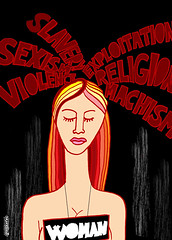Handling Hate At Work And In Business When It Might Not Always Be Hate
Posted by Mitch Mitchell on Sep 27, 2016
I'm going to admit something here. I get angry... often. There's a lot of things to get angry about, based on things I see and hear, mainly online, since I almost never watch TV and, except when I'm consulting, spend a lot of time working on my own.
 |
I can't blame it all on social media though. I've dealt with anger for decades; who hasn't, right? At some point all of us get angry at something, whether or not it affects us. Luckily, all of us don't go grab a gun and go out shooting people; that would be overkill (pun intended), and none of us want to go to jail or have something worse come to us.
Anger is one thing; hate is another. I often say that I hate this or that because it's a phrase that easily comes off the tongue, but when I think about it I realize that, though I say it often, I don't come close to hating as many things as I say I do... and frankly that also applies to people.
But I do hate. I hate racism; sexism; bullying; other isms; physical and verbal abuse; the general disregard for human life. I think that's fair; don't you?
There are even a few people in my life that I've truly hated, to the extent that had I had some kind of weapon, not necessarily a gun, I'd have wanted to inflict some serious damage on those people. Even now I'm still mad at them, but luckily I don't wallow in hate against them. These were people who made it personal; I feel pretty justified in my former hate against them and my every once in a while still angry self whenever I think of them.
Now that we've gotten that out of the way, let's turn to dealing with hate in the workplace, and why it's a leadership issue.
Only a naive person believes that hate as I described doesn't happen at work. There are way too many accounts of all those things above (probably not as much physical abuse but the other stuff) for them to be ignored. Any real leader knows that when these things occur that they need to do something about it. That they don't is inexcusable, if pretty regular.
 via Compfight |
I get it; dealing with these things can be really uncomfortable. It can be even worse when the person you need to address or call out is your peer, not someone working for you.
Still... I've done it. I called a director out once for making a sexual statement towards a female employee in front of me. I first talked to her, since I happened to be there, to see how she felt and what she wanted me to do about it. Then I talked to him, told him what he did was inexcusable, and gave him an option for what he needed to do. It was handled and that was that.
I also called out two HR directors at two different hospitals for the lack of diversity at those hospitals when I was an employee, and I've mentioned it to upper management at a few places where I've consulted. I "mentioned" it; as a consultant, unless I'm there working on a diversity issue there's not much change I can institute but as a black man I will always bring it up if there's something blatant going on.
I've been lucky overall. I've never had to deal with anything personal at it pertained to race, and the one business issue I had to deal with had nothing to do with an "ism"... although I still had to deal with me.
Thus, I'm not afraid to call out hate when I see it; leaders have to be strong to eradicate these types of things because they can impact the workplace in a negative light.
And yet... well... there are some issues that even I'm not sure how to fully deal with as it pertains to leadership.
There are a lot of protests lately against police brutality. I support those protests; I don't support the violence.
I also support those athletes, at all levels, who are protesting in their own way, making statements by not standing for the National Anthem, raising fists in the air, taking a knee... after all, it's a rising concern.
And yet... well... I wonder how I'd handle it in the workplace. What if an employee wanted to put something up on the wall of a cubicle showing support? For that matter, what if someone else wanted to put something up to support the police? Where does one draw the line when it's about peaceful protest, even if it could destroy the foundation of a good working relationship?
Would I be a hypocrite if I banned it, even as I condemn coaches of college and major sports who are condemning the protesters? Am I a hypocrite if I recommend you not allow such things in the workplace while supporting athletes doing it? If so, would I do it anyway?
Lucky for you, just because I said I'm not sure how to fully deal with the issues doesn't mean I don't know how I would deal with it. 🙂
 |
Whenever I've been in a position of leadership, even as a consultant, it's always been my intention to bring everyone together so that we can work towards a common goal, that being to make things better. I talk to everyone, individually and in groups. I always establish what the goals are and work to make sure all of us are on the same page when it comes to the goals. I try to make it plain that, though I'm the one in charge, that everyone has an equal opportunity to contribute, to learn, and to progress.
When the need arises, I'll also express an opinion on something, although I try not to be so blatant about that opinion. When it comes to external things, I can only remember one time where I expressed an opinion about something, and in that case it was an immediate reaction to something, which I gave myself 5 minutes for and then never talked about it again at work; thank goodness!
In other words, it's important to establish good communications early and often because it makes addressing other things so much easier.
If I had already established this type of relationship, then when something like protests come up, I would have no problem in first talking to the individuals to see where their minds were, and then bringing a group of people together to talk it out. True, the workplace isn't supposed to be a democracy, but even the most autocratic leader has to realize that if a majority of the employees are riled up that even if the leader tries to clamp down on them their concentration isn't going to be focused, thus mistakes and bad results will prevail.
So, we'd talk, get things out in the open, and ask everyone's opinion. After that, as the leader of the group I'd have to make a decision. Since I'd have already established our departmental culture, everyone would know that any decision I made would be, in my eyes, best for the department. Also, if need be, I'd have contingencies set up so that if things went badly based on that decision we'd go in a different direction, and I'd make that clear up front as well.
Outside of the isms, I'm good with freedom of expression as long as it doesn't separate people in the workplace. Having a ban on political and religious discussions is one of the smartest moves any business can take; we don't all believe in the same things, or in the same way. Everything else needs discussion, negotiation, and consideration.
In essence, I wouldn't make a rule in this case until I talked to everyone to see how we stood. Leaders can't be afraid to make decisions, but in the workplace we have to treat adults like adults. We can't, or at least shouldn't, make everything about our personal feelings. That's the major problem with the coaches I've been hearing who have been against the protests; it's their feelings they care about, and nothing else. How does that bring a team together?
Tough one isn't it? I'd love to hear your opinion and thoughts.


At the Philly PD, the following were no-no’s: posting stuff on cubicles, wearing printed materials or visually displaying anything advocating an opinion that causes another employee to feel that the workplace is hostile.
Theoretically, anyway. In truth, certain “isms” created an environment that bred just such behaviors and the paramilitary nature of the job left most civilians feeling powerless against the hypocrisy of the sworn personnel.
It was kind of difficult to address anger and hatred, when the only advocate was the Federal EEOC. Not too many people had the courage to bring action.
Cheers,
Mitch
That was probably happening during the time period Clarence Thomas was in the top position; the EEOC had a terrible record during that time period. Still, it shows that leadership wasn’t on top of things and allowed them to get out of control. That’s never a good thing, and you saw up close how fractured it allowed people to become. I’m sorry you had to deal with that kind of junk.